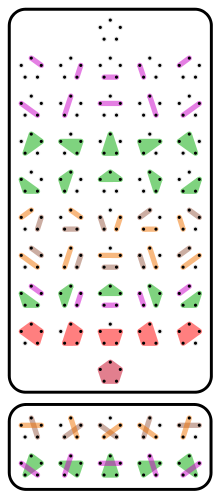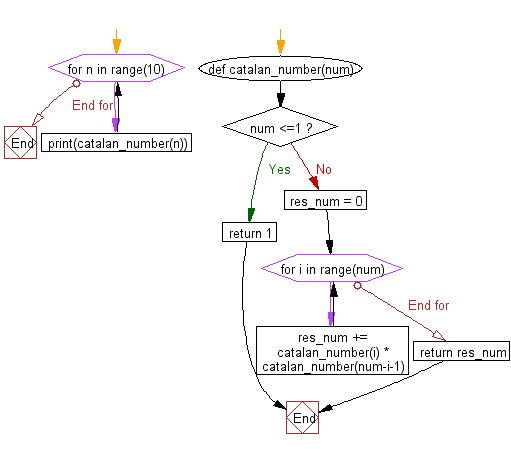Python Math: nth Catalan Number
25. Nth Catalan Number Calculator
Write a Python program for the nth Catalan numbers.
In combinatorial mathematics, the Catalan numbers form a sequence of natural numbers that occur in various counting problems, often involving recursively-defined objects. They are named after the Belgian mathematician Eugène Charles Catalan (1814–1894).
Using zero-based numbering, the nth Catalan number is given directly in terms of binomial coefficients by

The first Catalan numbers for n = 0, 1, 2, 3, … are
1, 1, 2, 5, 14, 42, 132, 429, 1430, 4862, 16796, 58786, 208012, 742900, 2674440, ....
Pictorial Presentation
The C5 = 42 noncrossing partitions of a 5-element set (below, the other 10 of the 52 partitions)

Image Credits: Watchduck
Sample Solution:
Python Code:
def catalan_number(num):
if num <=1:
return 1
res_num = 0
for i in range(num):
res_num += catalan_number(i) * catalan_number(num-i-1)
return res_num
for n in range(10):
print(catalan_number(n))
Sample Output:
1 1 2 5 14 42 132 429 1430 4862
Flowchart:

For more Practice: Solve these Related Problems:
- Write a Python program to compute the nth Catalan number using a recursive formula, and print the result.
- Write a Python function that calculates Catalan numbers iteratively up to n and then returns the nth Catalan number.
- Write a Python script to generate a list of the first n Catalan numbers and print the sequence.
- Write a Python program to compare the recursive and iterative approaches for computing the nth Catalan number and print both results.
Go to:
Previous: Write a Python program to convert a float to ratio.
Next: Write a Python program to print number with commas as thousands separators (from right side)?
Python Code Editor:
Have another way to solve this solution? Contribute your code (and comments) through Disqus.
What is the difficulty level of this exercise?
Test your Programming skills with w3resource's quiz.
